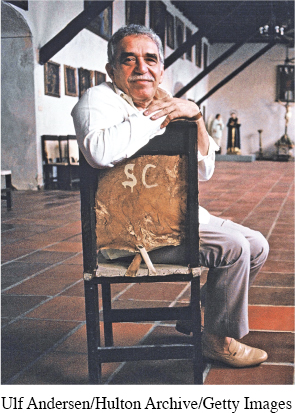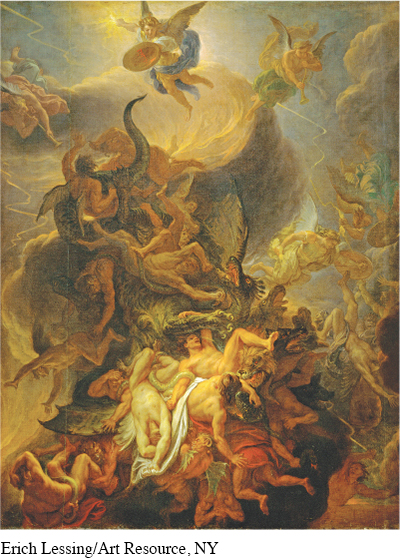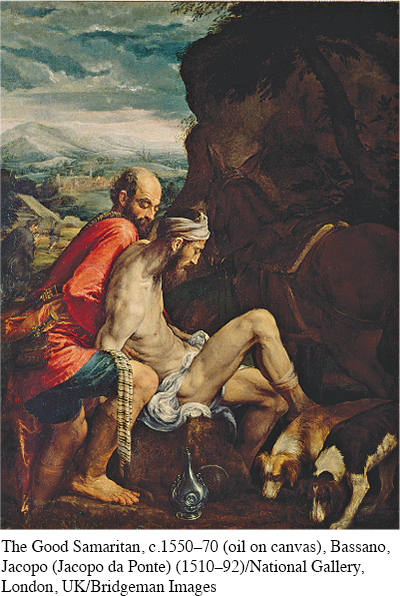7.5
A Very Old Man with Enormous Wings:A Tale for Children
Gabriel García Márquez

Translated by Gregory Rabassa
Colombian writer Gabriel García Márquez (1928–
KEY CONTEXT Even though he began his career as a journalist, García Márquez popularized what is often called “magical realism,” in which elements of fantasy are inserted into situations that might otherwise seem ordinary. For instance, a character in One Hundred Years of Solitude who is considered to be too beautiful for this world ascends to heaven while in the middle of hanging the laundry. García Márquez’s magical realism can also be seen in this story, in which a character named Pelayo finds an angel face down in the mud.
429
On the third day of rain they had killed so many crabs inside the house that Pelayo had to cross his drenched courtyard and throw them into the sea, because the newborn child had a temperature all night and they thought it was due to the stench. The world had been sad since Tuesday. Sea and sky were a single ash-
Frightened by that nightmare, Pelayo ran to get Elisenda, his wife, who was putting compresses on the sick child, and he took her to the rear of the courtyard. They both looked at the fallen body with mute stupor. He was dressed like a ragpicker. There were only a few faded hairs left on his bald skull and very few teeth in his mouth, and his pitiful condition of a drenched great-
“He’s an angel,” she told them. “He must have been coming for the child, but the poor fellow is so old that the rain knocked him down.”
On the following day everyone knew that a flesh-
5 Father Gonzaga arrived before seven o’clock, alarmed at the strange news. By that time onlookers less frivolous than those at dawn had already arrived and they were making all kinds of conjectures concerning the captive’s future. The simplest among them thought that he should be named mayor of the world. Others of sterner mind felt that he should be promoted to the rank of five-
430
seeing connections


This sixteenth-
In what way is García Márquez using the biblical story of the fallen angels being cast out of heaven as an allusion in this short story? What is similar and different between the two?


In the Bible, Jesus tells a parable about the Good Samaritan, a man who helped a stranger who was beaten and robbed, while several other people passed by without helping. The lesson is supposed to be “Love your neighbor as yourself,” and everyone should be considered your neighbor.
What is the Samaritan doing in this sixteenth-
431
His prudence fell on sterile hearts. The news of the captive angel spread with such rapidity that after a few hours the courtyard had the bustle of a marketplace and they had to call in troops with fixed bayonets to disperse the mob that was about to knock the house down. Elisenda, her spine all twisted from sweeping up so much marketplace trash, then got the idea of fencing in the yard and charging five cents admission to see the angel.
The curious came from far away. A traveling carnival arrived with a flying acrobat who buzzed over the crowd several times, but no one paid any attention to him because his wings were not those of an angel but, rather, those of a sidereal bat. The most unfortunate invalids on earth came in search of health: a poor woman who since childhood had been counting her heartbeats and had run out of numbers; a Portuguese man who couldn’t sleep because the noise of the stars disturbed him; a sleepwalker who got up at night to undo the things he had done while awake; and many others with less serious ailments. In the midst of that shipwreck disorder that made the earth tremble, Pelayo and Elisenda were happy with fatigue, for in less than a week they had crammed their rooms with money and the line of pilgrims waiting their turn to enter still reached beyond the horizon.
The angel was the only one who took no part in his own act. He spent his time trying to get comfortable in his borrowed nest, befuddled by the hellish heat of the oil lamps and sacramental candles that had been placed along the wire. At first they tried to make him eat some mothballs, which, according to the wisdom of the wise neighbor woman, were the food prescribed for angels. But he turned them down, just as he turned down the papal lunches that the penitents brought him, and they never found out whether it was because he was an angel or because he was an old man that in the end he ate nothing but eggplant mush. His only supernatural virtue seemed to be patience. Especially during the first days, when the hens pecked at him, searching for the stellar parasites that proliferated in his wings, and the cripples pulled out feathers to touch their defective parts with, and even the most merciful threw stones at him, trying to get him to rise so they could see him standing. The only time they succeeded in arousing him was when they burned his side with an iron for branding steers, for he had been motionless for so many hours that they thought he was dead. He awoke with a start, ranting in his hermetic language and with tears in his eyes, and he flapped his wings a couple of times, which brought on a whirlwind of chicken dung and lunar dust and a gale of panic that did not seem to be of this world. Although many thought that his reaction had been one not of rage but of pain, from then on they were careful not to annoy him, because the majority understood that his passivity was not that of a hero taking his ease but that of a cataclysm in repose.
Father Gonzaga held back the crowd’s frivolity with formulas of maidservant inspiration while awaiting the arrival of a final judgment on the nature of the captive. But the mail from Rome showed no sense of urgency. They spent their time finding out if the prisoner had a navel, if his dialect had any connection with Aramaic, how many times he could fit on the head of a pin,2 or whether he wasn’t just a Norwegian with wings. Those meager letters might have come and gone until the end of time if a providential event had not put an end to the priest’s tribulations.
432
10 It so happened that during those days, among so many other carnival attractions, there arrived in town the traveling show of the woman who had been changed into a spider for having disobeyed her parents. The admission to see her was not only less than the admission to see the angel, but people were permitted to ask her all manner of questions about her absurd state and to examine her up and down so that no one would ever doubt the truth of her horror. She was a frightful tarantula the size of a ram and with the head of a sad maiden. What was most heartrending, however, was not her outlandish shape but the sincere affliction with which she recounted the details of her misfortune. While still practically a child she had sneaked out of her parents’ house to go to a dance, and while she was coming back through the woods after having danced all night without permission, a fearful thunderclap rent the sky in two and through the crack came the lightning bolt of brimstone that changed her into a spider. Her only nourishment came from the meatballs that charitable souls chose to toss into her mouth. A spectacle like that, full of so much human truth and with such a fearful lesson, was bound to defeat without even trying that of a haughty angel who scarcely deigned to look at mortals. Besides, the few miracles attributed to the angel showed a certain mental disorder, like the blind man who didn’t recover his sight but grew three new teeth, or the paralytic who didn’t get to walk but almost won the lottery, and the leper whose sores sprouted sunflowers. Those consolation miracles, which were more like mocking fun, had already ruined the angel’s reputation when the woman who had been changed into a spider finally crushed him completely. That was how Father Gonzaga was cured forever of his insomnia and Pelayo’s courtyard went back to being as empty as during the time it had rained for three days and crabs walked through the bedrooms.
The owners of the house had no reason to lament. With the money they saved they built a two-
433
When the child began school it had been some time since the sun and rain had caused the collapse of the chicken coop. The angel went dragging himself about here and there like a stray dying man. They would drive him out of the bedroom with a broom and a moment later find him in the kitchen. He seemed to be in so many places at the same time that they grew to think that he’d been duplicated, that he was reproducing himself all through the house, and the exasperated and unhinged Elisenda shouted that it was awful living in that hell full of angels. He could scarcely eat and his antiquarian eyes had also become so foggy that he went about bumping into posts. All he had left were the bare cannulae of his last feathers. Pelayo threw a blanket over him and extended him the charity of letting him sleep in the shed, and only then did they notice that he had a temperature at night, and was delirious with the tongue twisters of an old Norwegian. That was one of the few times they became alarmed, for they thought he was going to die and not even the wise neighbor woman had been able to tell them what to do with dead angels.
And yet he not only survived his worst winter, but seemed improved with the first sunny days. He remained motionless for several days in the farthest corner of the courtyard, where no one would see him, and at the beginning of December some large, stiff feathers began to grow on his wings, the feathers of a scarecrow, which looked more like another misfortune of decrepitude. But he must have known the reason for those changes, for he was quite careful that no one should notice them, that no one should hear the sea chanteys that he sometimes sang under the stars. One morning Elisenda was cutting some bunches of onions for lunch when a wind that seemed to come from the high seas blew into the kitchen. Then she went to the window and caught the angel in his first attempts at flight. They were so clumsy that his fingernails opened a furrow in the vegetable patch and he was on the point of knocking the shed down with the ungainly flapping that slipped on the light and couldn’t get a grip on the air. But he did manage to gain altitude. Elisenda let out a sigh of relief, for herself and for him, when she saw him pass over the last houses, holding himself up in some way with the risky flapping of a senile vulture. She kept watching him even when she was through cutting the onions and she kept on watching until it was no longer possible for her to see him, because then he was no longer an annoyance in her life but an imaginary dot on the horizon of the sea.
Understanding and Interpreting
Trace the townspeople’s, including Pelayo’s and Elisenda’s, changing treatment of the old man through the course of the story. What conclusions could we draw about the theme of the story from this treatment?
What is the tone the narrator takes toward Father Gonzaga, and for what purpose?
How is “spider girl” different from the old man? Why is she a better attraction for the people? What point is García Márquez trying to make by contrasting her with the old man?
434
García Márquez gave this story a subtitle: “A Tale for Children.” In what way can this be considered a children’s story, and in what ways is it not one?
How do the last two lines, as Elisenda watches the old man fly away, illustrate the theme of the story?
Analyzing Language, Style, and Structure
Magical realism often includes paired contrasts; for instance, the otherworldliness of the man’s wings is contrasted with the ordinariness of the few faded hairs on his bald head. Identify similar contrasts in the story and explain how they create the sense of magical realism.
Compare these two sentences identifying the old man, and explain the effect of the townspeople’s conflicting conclusions:
“That was how they skipped over the inconvenience of the wings and quite intelligently concluded that he was a lonely castaway from some foreign ship wrecked by the storm” (par. 2).
“On the following day everyone knew that a flesh-
and- blood angel was held captive in Pelayo’s house” (par. 4).
Reread the following statement: “Pelayo threw a blanket over him and extended him the charity of letting him sleep in the shed, and only then did they notice that he had a temperature at night” (par. 12). Using this sentence and others that you identify, how would you characterize the narrator of this story? What is the narrator’s tone toward the old man and toward the townspeople?
This piece contains many examples of figurative language intended to create an exaggerated, somewhat unreal feeling for the town, such as “The world had been sad since Tuesday.” Identify other examples of figurative language and explain how they create this exaggerated effect.
Connecting, Arguing, and Extending
Evaluate the ethical choices that Pelayo and Elisenda make. Do they do “the right thing” or not? Who is harmed and who benefits the most from their choices? What are the most significant factors that cause them to make the choices they do?
Read a short story, novel, or poem classified as “magical realism.” In addition to García Márquez, some of the most well-
known authors of magical realism are Isabel Allende, Laura Esquivel, Jorge Luis Borges, Salman Rushdie, Toni Morrison, and Rudolfo Anaya. How is this author’s use of magical realism similar to or different from García Márquez’s use? Throughout the story, the old man tries to speak, but in a language or dialect that no one, including the narrator, can understand. Identify a place in the story where the old man is unable to communicate effectively. Now, imagine that he is capable of making himself understood, and write a few lines of dialogue that he might say. How would the townspeople react to his speech?
Read the following excerpt from García Márquez’s 1982 Nobel Prize speech, in which he responds to William Faulkner’s 1950 Nobel speech warning of the dangers of nuclear war. After reading the excerpt, explain how García Márquez’s tone toward humanity is reflected—
or not— in “A Very Old Man with Enormous Wings”:
On a day like today, my master William Faulkner said, “I decline to accept the end of man.” I would fall unworthy of standing in this place that was his, if I were not fully aware that the colossal tragedy he refused to recognize thirty-